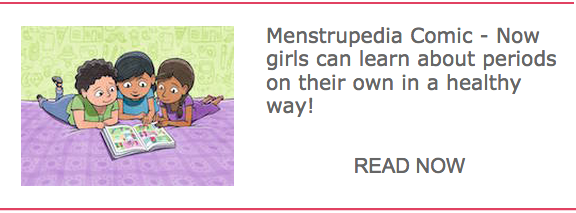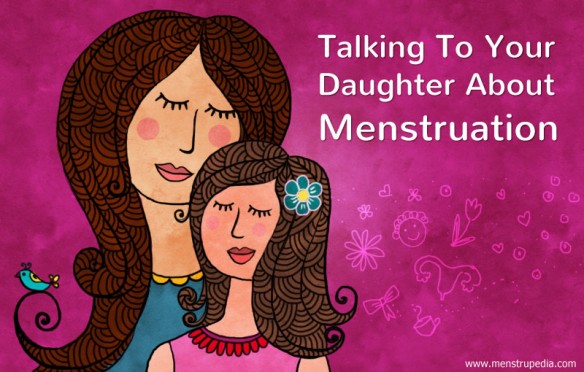Teaching kids about menstruation is something that not all Indian moms are comfortable with. We feel that our children will learn from their peers, or in school or just figure it out by themselves. We are hesitant as there is just so much to tell and we wonder how our little girls will react or even understand all that is happening.
However, it is very necessary to speak to a young girl about the changes that are occurring or will occur in her body. Puberty is a difficult age and many young girls feel uncomfortable with the physical changes that accompany it. What better way to make your child feel at ease with these changes than by sitting her down and talking to her? After all, we’ve all been down that road. So, when is the right time or is there any particular time you should start talking to your daughter about menstruation?
It’s never too early to talk to your daughter about menstruation
It is important to remember that there is no specific time or age that is too soon to talk to your child. Many Indian moms think their daughters are too young to understand what exactly is going on and feel it is best left for when the children are older.
Your daughter will experience many psychological and physical changes as she approaches adolescence. Many girls start their periods as early as 10 or 11 years of age. So make sure that you brief them about this so that they are prepared.
This is exactly why Uma Batra, an HR Manager in Mumbai and mother to 12 year old Pooja, spoke to Pooja when she was 10. Pooja was curious when she saw advertisements on sanitary napkins. “What is that for?” she questioned Uma. Uma stuck to the basics and explained menstruation in a very “straight forward, matter of fact way” to her then. She says, “When they are so small, you cannot go into much detail. Explain as simply and as basically as you can about what having a period is all about. It is better to explain and get the information across.” Young as she was, Pooja took this talk quite well.
Make your daughter comfortable about the changes
“There is a lot of wrong information floating about. Girls of today are exposed to so much and this evokes a lot of curiosity about many things,” says Dr. Namita Sharma, Pune-based Anatomist and mother to 15 year old Atoshi. Therefore it is all the more necessary and essential to educate your child about what is actually the reason behind menstruation.

Namita never felt awkward while talking to Atoshi. She feels that if a mother is awkward, the daughter will pick up on the awkwardness. “The main thing to keep in mind when you talk to your daughter about menstruation is that it is as normal as feeling hungry, eating food or even brushing her teeth”. When asked about her own conversation with her daughter, Namita states, ”I did not make a big deal out of it. I kept my tone casual. I made sure that I impressed on her that this was something that just happened.“
Stick to the facts when teaching kids about menstruation
Make the most of an opportunity when your daughter initiates the talk. As did, Nikita Sharma, school teacher in Bangalore and mother to 11 year old Gitanjali. Gitanjali came home from school one day and asked her mother, “Why do you use Stayfree?” Gitanjali had heard some of the older students talking about this and had also seen some advertisements on television.
Be honest, accurate and open with your child. Answer questions as and when they are put to you.
Nikita used this opportunity to talk to Gitanjali about menstruation. Her way of doing this was by actually drawing some pictures (being a biology teacher helped, she says) of what happens inside the body each month. Nikita also made sure that she spoke to Gitanjali about various changes that were occurring in her body as well. “My basic approach was that there is nothing wrong about this. I didn’t want Gitanjali getting wrong or incomplete information about this important change in her life.”
Answer all questions your daughter may ask
It is also vital not to ignore any questions your daughter may bring up, either during the conversation or even after. Do not brush questions aside with the usual ”you will find out when you are older”. This could lead to unnatural curiosity and a quest to find out may result in misinformation that could make matters worse. Be honest, accurate and open with your child. Answer questions as and when they are put to you.
Do not also share information that may not be needed at the time – your daughter has to assimilate what you have told her and this takes time. Puberty is also a time when a girl becomes aware of her own sexuality. Feelings of being different or feeling dirty may crop up. It is best to nip these feelings in the bud and ensure that your daughter realizes that this is all normal and very much a part of growing up. Take help from aunts or older cousins to hit home the point that it happens to everyone and at different ages as well.
Speak to your daughter as you would to a friend. It will help and it works too. It’s a tough world to bring up a child in today. Ensure that your daughter is educated and aware of what will happen to her. She will thank you for it someday.
This article is republished from Womens’s Web from here.






